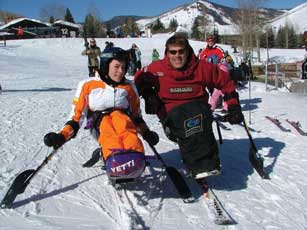So how does using adventure as a therapy fit with occupational therapy?

Occupational therapy is concerned with three areas of occupation; self-care, leisure and productivity.
The New Zealand Association of Occupational Therapists explain these occupation categories through Townsend's 1997 definition as "Everything people do to occupy themselves including, looking after themselves (self-care), enjoying life (leisure) and contribution to the social and economic fabric of their community (productivity)."
Mann (2007) proposes that adventure activities can fit into all three of these categories:
SELF-CARE: Using adventure as a means to keep physically active and healthy, engaging in social interactions, using it as stress relief, exploring ones identity and using interactions with nature to increase wellness
LEISURE: A number of NZers engage in adventurous activities for recreation, which can be participated in for enjoyment and social interactions.
PRODUCTIVITY: There is potential for adventure pursuits to be developed into a career and can be used as a means for community groups to strengthen community bonds, develop the communities young people or for an individual it can provide a community service.
Jansen (1999) states that there is a strong correlation between both occupational therapy and adventure therapy. As both involve the means in which to engage and work with people with a range of dysfunctions, with both having professional goals to improve participation and quality of life. Effecting change in the person, their thoughts and behaviours is the focus of adventure therapy and is also inclusive of one of the areas that occupational therapists target. Both occupational therapy and adventure therapy have activity as the core of there practice with an emphasis on learning through the process of doing.
As with all activities used in occupational therapy to create and facilitate change in people, adventure activities can be analysed, synthesised, graded and adapted to enhance outcomes.
"The point of difference we bring to any activity as an occupational therapist is that conscious process of recognising the therapeutic value in participation and occupation." (Mann, 2007, p.8)
Jansen, S. (1999). New ground to venture? Adventure therapy as a potential therapeutic medium within occupational therapy. Dunedin: Otago Polytechnic.
Mann, I. (2007). Is adventure therapy, occupational therapy? A therapist's perspective. OT Insight, 28(2):8-10.
OT seems really interesting, where can I learn about OT in New Zealand?
ReplyDeleteWow, never properly understood what OT and AT actually were until I read this. It made me think about how many different ways there were to look at adventure activity and it's potential to help others.
ReplyDeleteI think Adventure Therapy is a great way to help people feel more empowered and confident in themselves! I love how it's also changing the way people think about OT and their perspectives on it, it's definitely changed mine!
ReplyDeleteYou have supplied us with some really good information which has helped us develop a knowledge for both therapies. :)
ReplyDeleteThis is really interesting. I didn't really know about OT, yet alone AT, until I read this. AT sounds like a really great way to help people develop their confidence levels.
ReplyDeleteThanks for your comments. It's great to hear your views.
ReplyDeleteFor more information about OT in New Zealand you can visit;
The NZ Association of Occupational Therapy at www.nzaot.org.nz
and the Occupational Therapy Board NZ at www.otboard.org.nz